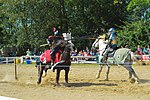Eaton Township, Warren County, Ohio
Defunct townships in OhioGeography of Warren County, OhioGreater Cincinnati geography stubs
Eaton Township was a township of Warren County, Ohio, United States. It was created on June 26, 1806, from the eastern part of Wayne Township beyond Caesars Creek. When Clinton County was created in 1815, most of the land became part of Clinton County.
Excerpt from the Wikipedia article Eaton Township, Warren County, Ohio (License: CC BY-SA 3.0, Authors).Eaton Township, Warren County, Ohio
Turkey Run Connector, Chester Township
Geographical coordinates (GPS) Address Nearby Places Show on map
Geographical coordinates (GPS)
| Latitude | Longitude |
|---|---|
| N 39.526666666667 ° | E -83.975 ° |
Address
Turkey Run Connector
Turkey Run Connector
45032 Chester Township
Ohio, United States
Open on Google Maps






